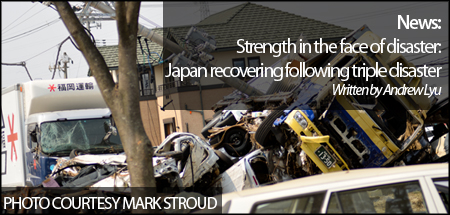
March 11, 2011. Sendai, Japan. At approximately 2:46 p.m., a magnitude 9.0 earthquake struck just east of Japan’s Tohoku region. The quake has been listed as one of the five largest since modern record keeping.
Following the quake, Japanese residents along the eastern coast of Tohoku region were alerted to evacuate due to a large tsunami prediction. Soon, waves which peaked at about 100 feet high crashed upon the eastern coastline of Japan.
The devastation Japan faced seemed almost unprecedented. In the face of damage estimates ranging as high as US$235 billion and a death toll of over 13,000 (with still nearly 15,000 unaccounted for), the Japanese government is also dealing with the nuclear crisis taking place at the nuclear power plant Fukushima Daiichi.
And yet, in the face of crisis, many commentators noted the surprising patience of the Japanese people. “[T]here was little looting that went on after the crisis. I commend the people who waited in line for hours to get water, food, recharge their cell phones, get gasoline, etc,” says senior Ayaka Chin.
For the people of Japan, even those of whom were not directly affected by the tsunami, life has drastically changed. “[B]because so many people have to buy water and food, everything is rationed at supermarkets,” says Junior Mariko Ishikawa, “My uncle said he can only buy one loaf of bread per visit.” Yet, despite the difficulties, it seems that the Japanese people were able to keep composure. “I’m proud that the people from my country would stay organized and be considerate of others while they themselves need help,” says freshman Rick Miyagi.
Even more admired was the heroism of the nuclear power plant workers at Fukushima Daiichi. “I think the workers that stayed at the plant made an incredibly courageous decision. I don’t know what I would have done if I was in their position,” says sophomore Marie Mihara.
Still, with the disaster mounting, anxious Aragon students awaited to hear from friends and family members in Japan. Several band students who had offered home-stays for the visiting Hanasaki Tokuharu High School band students late last winter received conformation that their friends in Japan were okay. “Their school was damaged slightly, but every person in their school was okay,” says sophomore and home-stay participant Olivia Marcus.
Sophomore Abby Clemens says “When I first heard about the earthquake, I was lying in bed waking up to a text I just received from my dad. My initial reaction was complete shock and endless worry.” Similarly, Junior Mizuki Takagi says, “I turned on the news, and saw the tsunami hitting the city live. It scared me a lot because I was witnessing possible deaths on TV, and while they were suffering, I was on the couch in the living room. I felt helpless.”
In the weeks following the crisis, Aragon students aimed to remedy this feeling of helplessness. Several groups at Aragon took up arms to raise money for Japan: students taking Japanese sold stationary, jazz students put on a benefit concert in San Jose, The Aragon Improv Team put on a benefit show.
Members of Aragon’s Red Cross club carried tin cans collecting money for Japan. After three weeks of hard work, they collected over $1,900.
Also, Aragonian members of the Youth Organization of Chinese Americans (YOCA) took part in selling “Pray for Japan” wristbands. Along with a coalition of 11 other high schools, YOCA was able to raise over $3,700. Junior and YOCA member Alice Zheng says “[Selling] was phenomenal. Even the littlest contribution will affect the livelihood of someone else in the world. If every high school student were to contribute just a little to the cause the difference we would make would be greater and more pronounced.”
Still, there are fears that there are certain problems in Japan that money can’t readily fix. The crisis of the Fukushima Daiichi has shaken the world. Fear of nuclear power has skyrocketed, and thus the nuclear debate is as pertinent as ever. “Nuclear scares people,” says history teacher Doug McGlashan. “People aren’t good at calculating [the] risk [of nuclear power].” The crisis at Fukushima Daiichi is still at a high level of emergency, but remains stable at its current status. Brave employees have stayed to keep the plant from reaching a point of catastrophe. For now, Japan and the rest of the world keep hopes up that things will look up for Japan.

